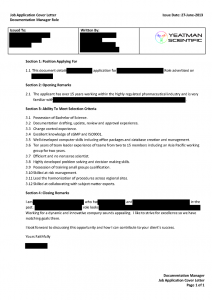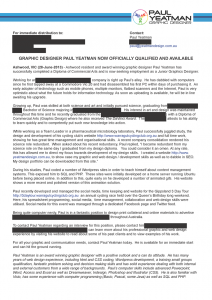Today I attended an interview for a science role. I’m never happy with my interview performances, so I like to prepare. This takes the form of researching a little about the company and working out likely interview questions. Despite this, normally a question or two gets that asked is not one that I have prepared for, so there is a little winging it, but not too much. For those questions I expect, if it calls for it, I have my answers already written down in STAR format. In the absence of notes, I tend to deviate from the pre-packaged answers so they do not sound rehearsed.
Today, I get to the interview and rust starts falling off me. The standard questions ‘tell us about your(self) career so far’, ‘what are your strengths and weaknesses’, ‘how do you make difficult decisions’ etc were asked. I have prepackaged answers for all of these which are good. Did I provide competent answers? Umm, no.
Three questions I also did not prepare for were ‘tell us about a time you dealt with a (customer) complaint’, ‘what sort of manager do you prefer’ and ‘what do you expect to be the greatest challenges in this role’. For that last one, that is a question I like to ask the interviewers, so being asked it myself through me for a loop. I also used “we” a lot in my answers, indicating I was giving a hypothetical answer, rather than “I”. That stems from my collaborative work style.
So, instead of my el crappo in a hatto answers, here’s how I should have answered.
Q: Why do you want to work in QA when you have a microbiology/QC background?
A:
I see the role of QA as being proactive while QC is reactive. In life I like to plan and be proactive in what I do so a QA role is more suited to my personality than the reactive QC role. Besides that, I see a QA role as a good opportunity to use my auditing skills, increase my knowledge of pharmaceutical processes and enact positive change (whether it be improved documentation, processes or other).
Q: Tell us about your strengths…(here I came up with one or two of them, but did not answer very well IMO)
A(a): I am quick learning
The most recent evidence of this is the DaVinci Award I received as part of my Diploma of Commercial Arts. It is given to the individual who improved the most over the duration of the studies. It shows I can take on new knowledge and apply it effectively.
A(b) I am flexible
In my previous role, my work day was not set in stone. When an unexpected sample arrived or I needed to attend to something unplanned for the day, I was able to rearrange things and not feel put out. As a scientist, I am flexible in my beliefs. I may believe faster than light travel is impossible now, but prove to me otherwise and I’ll update my beliefs. When I was studying part time, I needed to balance my study commitments with my full time work and my leisure time. Show me why your way is better than mine and I’ll adopt your practices, or modify them to improve my own. (Bit of a hodgepodge of answers, but it gets the point across).
A(c) I am good at planning and organising
Having been involved in many projects over the years and not having access to a program such as Microsoft Project, I took it upon myself to create my own gannt chart. This enables me to track what I am working on and assign dates for completion. This has come in handy in the case of test process validation as one can see that certain steps need to be completed before others. By using a chart, it is also easy to see where a step takes longer than planned or predicted and one determine if such as step can be hastened. Eg for some non priority reports, it may take months to get final signoff. The use of SMART goals also helps with planning. If there is no clear output from a task, then there is no real point in the task. As a cyclist, I have an annual training plan I develop each year which incorporates SMART goals.
A(d) I am great at checking documentation
When I am checking other’s paperwork, I pick up errors and omissions like a hawk and feed this back to the originator for correction.
Q: Tell us about your weaknesses…(only came up with one of them).
A(a): If it is my own paperwork, it needs to be put aside for about a day before I proof read it
Thanks to having good visualisation skills, when writing documents, my mind can race ahead of my fingers. This can lead to some strange wording. If I proof read a recently written section of text I’ll also see what I remember writing, not what is actually there. I find putting the work aside for about a day and proof reading it then leads to a quality document.
A(b): If I have imagined it happened, then I think it has.
Due to my visualisation skills, often if I think of doing a task, I’ll swear I actually did it. To address this, I like to keep a to do list and check it off when tasks are complete. That way I can document that I have done something, rather than remembering (incorrectly or not) that I did it.
The customer complaint question was tricky as I’ve not dealt with these directly. The only exposure I have had is with testing samples from complaints and reporting back on the results as well as proof reading customer complaint reports and suggesting additional investigations or text clarifications. In reality, if there was a complaint, then it would be dealt with according to established procedures (which if they did not exist, I would research what to do and then document it)…
Q: How Have You Dealt With Customer Complaints?
A: I have not dealt with these directly, however I have examined and tested samples from complaints and reported back on the results as well as made recommendations as well as proof read customer complaint reports and suggested additional investigations or text clarifications. In reality, if there was a complaint, then it would be dealt with according to established procedures (which if they did not exist, I would research what to do and then document it).
Examples of my role in the customer complaint investigation process include: a) I tested black spots on a disintegrated tablet that had been returned from Brazil. The spots were found to be Penicillin which I determined probably came from the user’s environment. I provided a report of my investigations to the customer complaint officer in QA. b) More recently, I was consulted with regularly by a member of the lab who had been seconded to deal with customer complaints. I would regularly proof read their reports and suggest improvements in grammar or information flow.
Q: When have you made a difficult decision (this one started out ok, but degenerated).
A: I never make difficult decisions as once all factors have been examined, the only possible decision of the logical one
Once I gather all available data, it is weighed against the regulatory requirements, internal requirements, risk assessment tables and any other relevant spec and then a decision is made.
An example would be when I was on an interview panel for a new microbiologist for my team. Two of the candidates appeared equally suited for the role. Whoever scored more highly on our list of essentials got offered the role.
The actual answer I gave dealt with needing to retest a buggy sample and deciding on what to do, which was not difficult (as demonstrated by the “good” answer).
As well as these, there was the standard ‘where do you see yourself in the future, job wise’ question which I tend never to answer well as long as I am learning and applying my knowledge and skills, I am have no preference for what I am doing or how much responsibility there is.
Q: What sort of manager do you prefer
A:
One that appears to be trustworthy, has a clear direction for their team and ensures the team has the skills, training and resources in order to get the job done. They support their team’s decisions and provide direction (but not solutions) to issues that arise. The best leaders are those that on the face of it, do nothing while in reality, they are behind the curtains, pulling the strings and keeping their team on target.
So, that’s how I should have answered. Worse case is I do not get a second interview. At least I get to add/modify my list of interview questions and answers.


